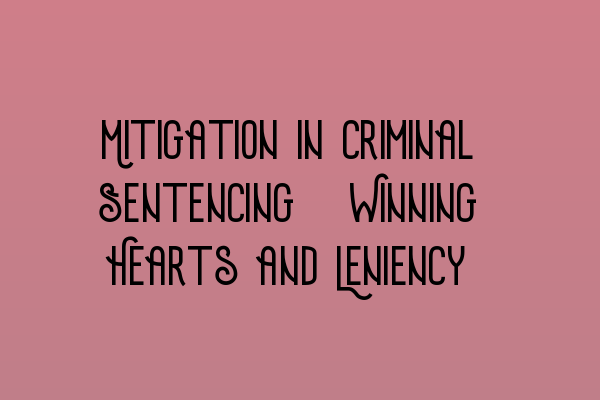Mitigation in Criminal Sentencing: Winning Hearts and Leniency
When it comes to criminal sentencing, the role of mitigation should never be underestimated. Effective mitigation can make a significant difference in the outcome of a criminal case, potentially leading to a more lenient sentence for the defendant. In this article, we will explore the importance of mitigation in criminal sentencing and how it can be used to win the hearts of judges and secure a favorable outcome.
Understanding Mitigation
Mitigation refers to the act of presenting arguments and evidence to the court, with the aim of persuading the judge to impose a less severe sentence. It is an essential part of the sentencing process and provides an opportunity for the defendant’s legal team to present a comprehensive picture of the defendant’s character, circumstances, and remorse.
Effective mitigation requires careful preparation and a deep understanding of the legal principles involved. This is where attending workshops and seminars on criminal practice can be immensely beneficial. These events offer opportunities to learn from experienced practitioners and stay up-to-date with the latest developments in criminal law.
The Power of Persuasion
Winning the hearts of judges through compelling and persuasive mitigation is essential. Judges are human beings with emotions, biases, and discretion. By presenting a strong case for mitigation, legal professionals can tap into these considerations and influence the judge’s decision-making process.
One key aspect of persuasive mitigation is storytelling. It is crucial to create a narrative that humanizes the defendant and highlights their positive attributes. This narrative should focus on factors such as the defendant’s background, upbringing, and past contributions to society. By doing so, the aim is to evoke empathy and understanding in the judge, increasing the chances of a lenient sentence.
Keeping up with updates in UK criminal laws is crucial for effective mitigation. The legal landscape is constantly evolving, and understanding the nuances of recent changes can help legal professionals craft compelling arguments that align with current sentencing guidelines and precedents.
The Role of Evidence
Presenting compelling evidence is a key component of successful mitigation. This evidence can include testimonials from family, friends, and colleagues attesting to the defendant’s character, as well as expert opinions on the defendant’s mental health or substance abuse issues. Additionally, evidence of the defendant’s efforts to make amends, such as participation in rehabilitation programs or community service, can also be persuasive.
For a deeper dive into the rules and intricacies of presenting evidence in criminal cases, our article on decoding criminal evidence rules offers a detailed analysis that can enhance your understanding and preparation.
Supporting Victims’ Rights
While effective mitigation focuses on the defendant, it does not mean ignoring the rights and needs of the victims. Mitigation should be balanced with sensitivity towards the victims and an acknowledgment of the harm caused. Demonstrating the defendant’s remorse and commitment to reparations can help address the court’s concerns and strike a fair balance between leniency and justice.
The importance of victims’ rights in criminal procedures cannot be overlooked. To learn more about the legal protections and support available for victims, we recommend reading our article on ensuring rights of victims in criminal procedures.
Conclusion
In summary, mitigation plays a crucial role in criminal sentencing by presenting a compelling case for leniency. Through persuasive storytelling, evidence presentation, and an understanding of the legal landscape, legal professionals can win the hearts of judges and secure favorable outcomes for their clients. Attending workshops and seminars on criminal practice can enhance your expertise in this area, while staying informed with updates in UK criminal laws is essential for effective mitigation strategies.
By enhancing your SQE criminal law study group experience, as discussed in our related article, you can further develop your skills and knowledge in this important area of criminal practice.
